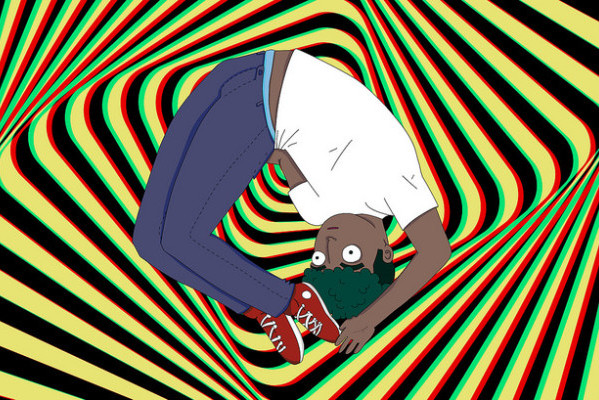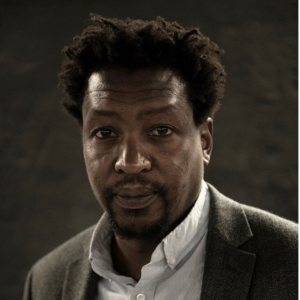He ran out of luck in seconds before he could merge with the crowd of Christmas shoppers, before my mouth could even form a half O from the shock of what I saw.
The woman’s reaction was so quick for someone her size. She turned swiftly, her feet still rooted to a spot and grabbed the thief by the scruff of his neck, before her big hands slid down and grabbed the entire collar of his shirt and her legs adjusted to keep faith with the rest of her body.
“Thief! Onye oshi! Give me my purse!”
The thief struggled to break lose, but it was too late. A mob was brewing. And from what I’ve heard about this town, this crazy town, the thief’s next bus-stop could be somewhere extra-terrestrial.
“The way tires and petrol will appear from nowhere is what I don’t understand,” Obioma would say, his eyes going wide with genuine surprise.
I still wonder how, despite growing up in Aba, he is shaken by ‘ordinary’ things like stripping a thief naked on the streets or setting them ablaze in broad daylight. It didn’t matter whether the thief was male or female. If the victim were male, he was just stripped naked and allowed to walk and dangle along the road, occasionally being hit by two-by-two planks, bamboo sticks or just stones, before the coming of the tires, petrol and matches. If she were female, she was stripped naked (very important) and allowed to walk down the road, face bowed in shame, the object of pitiful stares from fellow women, not to mention the occasional smacks on her buttocks by her lewd escorts. I hadn’t spent up to two full days in Aba, but I was familiar with these things. I didn’t stay four years with an Aba-brought-up roommate for nothing.
First things first. The woman collected her purse and walked quickly towards the market. It was the day before Christmas, and the crowd at Ariaria Market was always unbelievable. The mob was deciding what to do with the thief who was now in his boxer shorts and receiving blows and slaps from front and back.
“Bring tire!” someone shouted from the mob.
“Yes, let’s finish the idiot!”
My heart was pounding. I remembered Obioma’s words about the sudden appearance of tires and instinctively scanned the area for a possible source of ‘necklace’. I have always imagined what it was like watching another man beaten to death or set ablaze as the case may be. It made me sick that people actually made the effort to witness another man fight for his life and finally lose it. My roommate said, as young teenagers, they often ran to execution grounds to watch men killed!
“It’s nothing much,” she’d say when I looked at her as though she were as despicable as the killers. She told me watching someone burn to death was nothing compared to what the bakassi boys did to fellow human beings. They butchered armed robbers into parts and carried them around Ariaria Market in wheel barrows as a deterrent to others before disposing their chopped, bloody remains in the large burrow pit at Enyimba Bus-stop.
I wondered what would happen when they didn’t find tires, whether they would stop a moving car and rob its spare tire just for this occasion. I don’t see that happening, but crazier things have happened in Aba. Like beating up a passing, unyielding driver and using his car to take accident victims to hospital and then threatening the doctor to start treatment without initial deposit, hospital card or any of those prerequisites. Stories from Aba effectively placed the town beyond the descriptive grasp of adjectives. It was a town where everything happened at once, a city in a lawless class of its own.
“They won’t kill him,” said the woman braiding my hair, slicing into my thoughts. “They will do Christmas for him and let him go.” She sounded so sure. I believed her. She must have lived long enough in Aba to know which thief was killable and which was not. I lifted the mirror to my face to check how much longer I had to sit here. She was quite fast. Her fingers moved expertly, and her hand did not hurt as much as when I made my braids in Owerri. When Obioma brought me here and said it was one of the best salons, I scoffed at him. This small, dingy place couldn’t possibly compete with the worst salons in Owerri. The place was shabby even by Aba’s low standards. I couldn’t stay five minutes inside. It was so hot I quietly asked whether we could go out to the balcony. Since it was only braids, we won’t be needing the hair dryer. The thought of entering the dryer in that hot room was scary. We had barely sat five minutes outside when the thief struck. My eyes had just picked him out for no reason before he expertly grabbed the fat woman’s purse.
“Why are you sure they won’t kill him?” It was the first time I would talk to her since we came out to the balcony. There was nothing to talk about. She did not pull my head to unnatural angles. Her hand did not hurt, and she was fast.
“They’re not serious.” She said, as though she were disappointed that the thief won’t be killed.
“Maybe it’s because they couldn’t find tyre,” I said, hoping it wasn’t a completely stupid thing to say. It was.
“Tire kwa?” she asked, as though it were the dumbest thing she’d heard. “Which one is tyre? There are many ways to kill a rat na. They can plank him to death if they want. Tire is not a problem. They can get enough tires before ten seconds. They are not just serious, maybe because it’s Christmas period or they just want to pity him. If they were really serious they would have killed him already. No time.” I observed the movements of her fingers did not slow down when she talked.
There are many ways to kill a rat! It struck me how, with each passing day, we shed bits of our humanity easier than the trees shed their leaves in harmattan. I suddenly disliked the young girl for conveniently equating a fellow human with a rat. Who knows whether she thinks she’s braiding a doe’s hair!
After a while she said, “You don’t live in Aba.” It wasn’t a question. She put it to me, like Nigerian lawyers say. She sounded empathetic. I felt bad that I decided to dislike her because of what she had said some minutes ago, perhaps she had said it innocently, oblivious of its connotations.
“Yes. I live in Owerri. I just came into Aba yesterday, for the first time.”
“For Christmas? Are you from this place?”
“No. My cousin is wedding the day after tomorrow.”
“Eiyaah…” she said, expressing her happiness, making me regret that I had taken her earlier statement too seriously. “I’m happy for her.”
I thought of telling her the cousin was not female, but what does it matter? Instead, I thought of what people really meant when they said “I’m happy for you.” Are they really happy, or do they say it because it’s expected of them?
“Your hair is rich. I like it.”
“Thanks,” I said, genuinely pleased, liking her some more.
“Why didn’t you make it in Owerri?”
“So you don’t like how I came to your shop?” I asked, hoping it sounded funny.
She laughed. “No na, I’m happy. I just asked.”
“OK. I didn’t have time to make it in Owerri, and I had to be in Aba today, so I decided to make it in Aba. My cousin brought me here.”
“OK. I hope you will like the hair when I finish.”
“Yes. I like what I see so far,” I said, raising the mirror to my face, then pushed it forward a bit to see her face which I hadn’t bothered with. She was about twenty and remarkably beautiful. I noticed she was wearing a low-cut, so I said, as a brought down the mirror, “You braid people’s hair, but you wear a low-cut.”
She laughed, a hearty laugh. “No time o, Aunty,” she said, still laughing. “No time to make my hair.”
Before she finally stopped laughing, I was already thinking about why the average person in Aba would always say “No time.” Among other things, Aba was known for having its peculiar argot, different from the central Igbo or any other version of Igbo spoken elsewhere. When someone from Aba spoke, you knew he was from Aba. When a typical Aba man meets the other anywhere in the world, two minutes of conversation in Igbo is enough to know you are speaking to a fellow Aba person. And being from Aba does not necessarily mean being a native of Aba. Once you were born or raised there or have spent enough time to acquire the language or be influenced by the inherent lawlessness and ruggedness (they call it ruggedity) of the place, you have qualified to be nwa Aba.
I believe the phrase “no time” aptly captures the general philosophy of the town. Aba was full of people in perpetual motion, driven by unseen forces which forbade them to be lazy, succumb to defeat, live by the rules or be conscious of borders. Nwadiuto my roommate said she dumped her boyfriend because there was no time for guys like him. She didn’t tell me what the guy did. The other time she returned from an exam looking dejected, she hadn’t written well. I tried to console her, telling her not to lose hope because she could still pass the paper. She said she was going to give the lecturer five thousand naira to upgrade her score because there was no time…
When I remembered to look, Faulks Road was bustling with people: hawkers, wheel barrow pushers, shoppers, bus conductors and roadside sellers, all shoving and pushing and cursing, drawing from the city’s rich pool of expletives. I didn’t even know what happened to the thief. I guess there was no time for him to face ‘justice’.
********
About the Author:
Image by lookcatalog via Flickr.
 Nnamdi Nwaigwe was born and raised in Aba, Nigeria. He attended Abia State University. He has been observing events in African literature from a distance but recently decided to come closer and stick a toe into the literary waters. No Time is the first story he is sending out for publication.
Nnamdi Nwaigwe was born and raised in Aba, Nigeria. He attended Abia State University. He has been observing events in African literature from a distance but recently decided to come closer and stick a toe into the literary waters. No Time is the first story he is sending out for publication.










udoh chris June 13, 2016 02:27
i still create time to read through.....nice one you inspire me to take note of my environment..